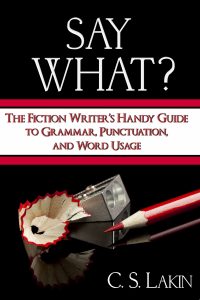What Writers Need to Master Their Craft
Many people want to write a great book, but they don’t want to get into the weeds with grammar, punctuation, and syntax. Yet, those are the tools of a writer’s trade. Can you imagine a home builder showing up on the job site without his truck full of tools? Or not having the experience with any of those tools and attempting, say, to use a chop saw or hammer drill? That’s a disaster in the making!
Some writers feel the mechanical aspects of writing will interfere with their creativity. That stopping the flow of creativity to fix the noun/verb agreement or look up a rule regarding mass and count nouns will hinder the writing. And I get that, because it does cause distractions when that editor on our shoulder keeps interrupting with corrections or grammatical questions.
However … how can someone honestly become a master of the writing craft if they don’t actually master writing mechanics? That’s not to say you need to memorize the Chicago Manual of Style from cover to cover. But getting proficient in the language you write in is only logical. And it makes the writing so much easier!
I hear groans. I hear protests. You hated English Comp in school? Old, crotchety Mrs. Snigglegrass made you dissect sentences and name the parts of speech? You got a what as your final grade?
I feel your pain. Who ever makes grammar fun and easy? Learning grammar, to some people, is as much fun as getting a tooth pulled. Or having to memorize the multiplication tables or the capitals of all the countries in the world (remember when they never changed?). Terms like dangling modifiers, predicates, participial phrases, and subjunctive mood give some people the chills. Did you have to conjugate verbs back in junior high? Do you know the difference between the past progressive tense and the past perfect?
No? Do you care? Likely, you don’t.
Every Vocation Requires a Knowledge of Tools
How in the world will you be a proficient handler of the English language if you don’t know anything about the tools of your trade? What would you think if you brought your ailing car to a mechanic and he didn’t have any tools in the shop? Or he had a box full of tools but hadn’t a clue how to use any of them correctly?
For some reason, many writers feel they should get to “pass go” and proceed to “the bank” without having to do the hard work of learning to write well and become a master (or mistress) at handling language. I often wonder about the logic of that.
I work on about two hundred manuscripts a year—critiquing and editing—and I’m astonished at how poorly written some are. I’m not talking about novel structure, which is difficult and tricky to learn. I’m talking about very basic grammatical issues—punctuation, spelling, sentence structure. Granted, many writers send me a rough draft to work on, so I don’t expect them to have edited it to perfection. But what I see a lot is a lack of understanding regarding so many of the basics of good writing.
A Time to Gush and a Time to Polish
Some of this is just sloppy or lazy writing due to hurrying to slap thoughts on the page, and I get that. I encourage writers to gush and let their prose flow in their first draft. But I would expect they would then follow through by rereading at some future date and cleaning up the mess. And more importantly, knowing how to.
I’m not saying every writer must have super editing chops and spend months memorizing the Chicago Manual of Style. Just as we don’t expect all doctors to memorize Gray’s Anatomy. (Should we? Do they?)
I’m afraid, though, that many writers haven’t a clue how to clean up their messy manuscripts. And even worse, many don’t really care. They think it’s their editor’s job to transform the mess into perfect prose. And we editors often do that; maybe you think I should be grateful for the job security. But, speaking for myself, I would rather work on a draft that’s been carefully edited and shows the writer not only cares about what she’s written but has a respect for the English language (or whatever language she writes in). The way some writers mutilate language makes me wonder if they have a love-hate relationship with writing.
A mechanic or building contractor will take good care of his or her tools, learning to wield them correctly, and will choose the best tool for the specific task at hand. Words are the writer’s tools. Shouldn’t writers treat words similarly? We expect that anyone wanting to become a teacher, nurse, commercial truck driver, or plumber has to hit the books and learn their vocation. So why do so many people feel that being a writer exempts from having to take the time to learn proper grammar? Who started that lie anyway?
Proficiency Leads to Competency and Confidence
One morning I asked my surgeon/author friend to describe how he prepared for each surgery. He went on to explain how he filled out a “menu” of the surgical instruments he would need, which varied depending on the type of surgery he was about to perform. He would put a checkmark next to numerous scalpels and other items (which I wouldn’t know what to call) and then turn in his menu. When he entered the operating room, he’d find his requested instruments and accessories neatly lined up waiting for him. With those specific tools, he could perform his surgery efficiently, competently, and confidently.
Well, no one is going to die if I don’t have the exact grammar tools or know all the rules when I sit down to write my novel, right? (you may be arguing). True, although I’ll be daring enough to say if you are lacking a lot of those proper tools, the patient (read: your novel, story, article, or post) may die a slow (or quite fast) and painful death. Which could have an adverse effect on your career as a writer.
You want your writing to shine. You want to show the world you are a terrific writer. Well then, Physician, know thy tools. Then you can perform your writing “operations” efficiently, competently, and confidently. And let me just add this: when you have the right tools and know how to use them, it always makes a job so much easier than if you don’t.
The fun thing about being grown-ups is we can decide how, when, and what we want to learn. The challenge is to erase the bad associations we have with certain subjects we suffered through in school (such as English Comp?) and find a new joy in the learning. It may sound trite, but it truly is a matter of attitude. Make the decision to adopt a healthy attitude about learning grammar. Set aside some time each day or week to dig into books or websites that can teach you what some of those yucky things are all about. Who knows, you may even learn to love those dang(ling) participles or misplaced modifiers!
Here’s a Book That Will Help!
 Over the years I compiled my grammar posts, and I published this handy grammar guide! It includes three years of posts and offers dozens of writing tips specifically for fiction writers.
Over the years I compiled my grammar posts, and I published this handy grammar guide! It includes three years of posts and offers dozens of writing tips specifically for fiction writers.
Who has the time to spend hours mulling through books or online sites looking for that quick answer to a specific grammar question? Not me. With these short, concise, and entertaining explanations of the most common issues writers face in regard to grammar, punctuation, and word usage, you can find your answer and get back to what really matters—writing!
Don’t leave the editing to the editor? You’ll write better and save money by spending time becoming proficient in grammar. And it can actually be fun!
Featured Photo by Richard Dykes on Unsplash







